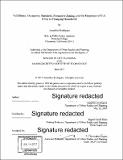Full house : occupancy standards, normative zoning, and the responses of U.S. cities to changing households
Author(s)
Rodriguez, Amarillys
DownloadFull printable version (10.10Mb)
Alternative title
Occupancy standards, normative zoning, and the responses of U.S. cities to changing households
Other Contributors
Massachusetts Institute of Technology. Department of Urban Studies and Planning.
Advisor
Ingrid Gould Ellen.
Terms of use
Metadata
Show full item recordAbstract
Both long term and more recent socioeconomic, demographic, and cultural shifts have led to changing household formation patterns. Alongside a rise in living alone and adult children remaining in their parental homes have been increases in doubled-up or more-than-one-family households and non-family households. However, U.S. zoning codes and housing markets have long favored single-family homes and living arrangements. Have cities adapted to changing household trends? If so, how? Whether they have or not, what influences their responses? This thesis addresses these questions through a qualitative analysis of the occupancy standards- specifically family or household definitions, limits on the numbers of unrelated people in a single-family dwelling, and spatial requirements--of twenty-four cities across the country and deeper analysis of selected case studies. The findings show a range in approaches to relationship-based occupancy standards that indicate some acknowledgement of different household structures, but most codes still favor traditional families defined by blood, marriage, or adoption. Both relationship- and space-based occupancy standards are often supported for health and safety reasons or to "maintain neighborhood character," but these reasons and the typically selective enforcement of these codes often favor wealthier homeowners or have exclusionary intents and impacts. The discrepancies between occupancy standards and household trends have important implications for the form, availability, and affordability of the current and future housing stock, neighborhood dynamics, and the housing security of households in cities nationwide. I argue that planners need to be aware of and resist the normative biases and assumptions about families and homes ingrained in most zoning codes and offer recommendations for planning practice with regards to occupancy standards for single-family dwellings that support more flexible, equitable, and inclusive communities.
Description
Thesis: M.C.P., Massachusetts Institute of Technology, Department of Urban Studies and Planning, 2017. Cataloged from PDF version of thesis. Includes bibliographical references (pages 97-104).
Date issued
2017Department
Massachusetts Institute of Technology. Department of Urban Studies and PlanningPublisher
Massachusetts Institute of Technology
Keywords
Urban Studies and Planning.